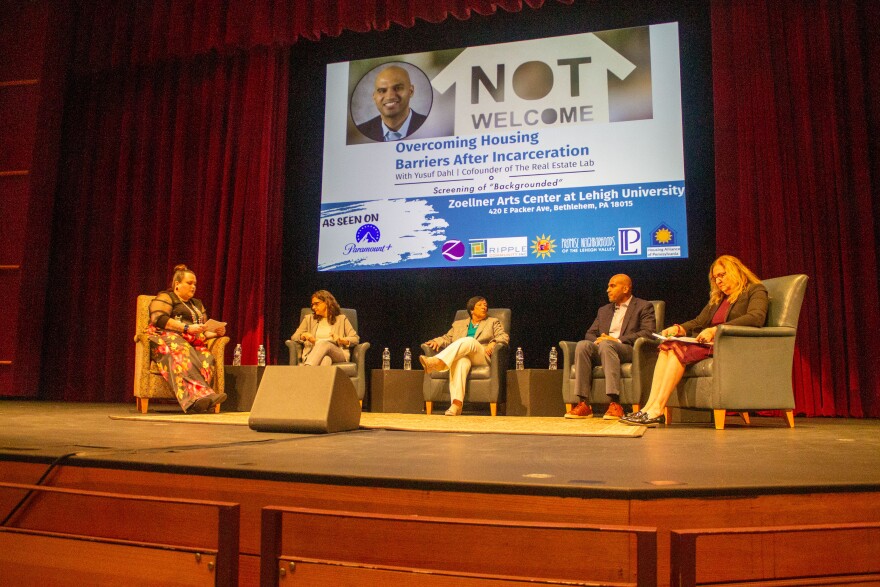- Allentown was the subject of a recent Vice TV documentary on the housing crisis
- The episode was screened at Zoellner Arts Center on Tuesday and was followed by a panel discussion
- One of the members of the panel, Yusuf Dahl, is in the Vice documentary, which tells his story of being rejected from renting a home in Allentown
BETHLEHEM, Pa. — Allentown was front and center in Vice TV documentary on the housing crisis that screened Tuesday at Lehigh University's Zoellner Arts Center.
The screening prominently featured Yusuf Dahl, who served 10 years in prison for a drug conviction, then turned his life around.
Dahl graduated from Princeton University and became a success in the real estate industry before being rejected from renting a home in Allentown because he had been in prison.
"I spent the last five years working 16 hours a day to have the resources to put my family in this community," he said in the documentary, pointing to a luxury home on the outskirts of Allentown that he applied to rent.
"Yet, because of that decision, from over 25 years ago, it doesn't matter."
The irony of his story — being a real estate mogul and having more than enough resources to pay for the home, only to be rejected — was so salient that Vice picked it up in 2023 to appear in its HBO series.
Dahl's story was part of an episode with host Alzo Slade, released in May, called "Backgrounded."
Panel
The panel also included Rita Dallago, the executive director of the PA Residential Homeowner's Association, and a real estate company owner; Lyn Kirshenbaum, a senior management analyst with HUD's Mid-Atlantic Region; and Gale Schwartz, the associate director of Policy and Programs for the Housing Alliance of Pennsylvania.
Conversation among the panelists was largely solution-oriented, geared toward the specific barrier of people who have served time in prison and can't easily access basic needs such as a reasonable place to live.
Echoing reporting from the documentary, panelists spoke about steeper rent prices for those with criminal records, and landing in apartments that are their "last choice" after being rejected from more desirable ones after the background check part of the application process.
"So we talked, and he explained why he was incarcerated, and the fact that he now needed a one-bedroom was because his family was torn apart — and he felt really bad about it."Rita Dallago, owner of Duggan Realty Group and Executive Director of PA Residential Homeowners Association (PROA)
One perspective that stood out was Rita Dallago's — she's now director of a homeowners association and owns a real estate company, but cut her teeth as a small-time landlord.
Dallago told the story of her experience renting to someone who served time — which Dallago said she now often does.
"One of the very first times, I had a gentleman who came to me with an application for a one-bedroom, and he was very, very upfront about it," Dallago said during the panel discussion.
"He was just getting out of jail. So we talked, and he explained why he was incarcerated, and the fact that he now needed a one-bedroom was because his family was torn apart — and he felt really bad about it.
"So based on his sincerity, and because he was very upfront about it and polite, I took his application."

Dallago said the man became an excellent tenant — paid rent on time, was kind and courteous with her and the neighbors, and even helped tidy up the property.
"And then, after a short period of time, he asked if he could rent one of our townhomes because he was getting his family back together," Dallago said, That evoked applause from the audience.
Background checks
It is well-documented that ex-prisoners have a hard time finding a place to live after they're released.
Anecdotally, panelists, including Dalh, said their interpretation of the norm is that the bigger property management companies tend to mandate a background check and have a blanket policy that prohibits ex-inmates from renting.
Smaller companies or individual landlords are likely to be more flexible and understanding, especially after meeting the applicant who is looking to rent and having a good impression of them, they said.
The panel veered to a less hopeful note, remarking that artificial intelligence and the rise of more blanketed, automated procedures for screening potential tenants could exacerbate existing biases.
"We know that race, income are predictors of justice involvement," Dahl said.
"And so if you take this position [that people with criminal records shouldn't be allowed to rent], well, you're perpetuating a system of discrimination and disadvantages [that] plagued this country from the very beginning."
The panel ended, however, on a hopeful note.
It largely agreed that exposure to the issue through media such as the documentary they screened could change the way property management companies treat applicants who have spent time behind bars.


